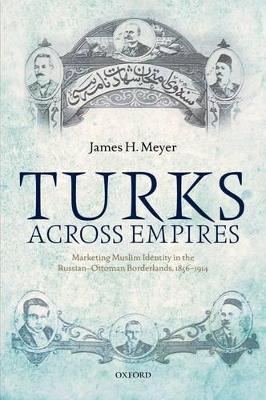
Turks Across Empires
Marketing Muslim Identity in the Russian-Ottoman Borderlands, 1856-1914
Seiten
2014
Oxford University Press (Verlag)
978-0-19-872514-5 (ISBN)
Oxford University Press (Verlag)
978-0-19-872514-5 (ISBN)
Tells the story of the pan-Turkists, a group of Muslim activists who became involved in a wave of revolutions taking place in Russia (1905), Iran (1906) and the Ottoman Empire (1908), demonstrating how theirs is part of a larger history of trans-imperial Muslims, the Russian-Ottoman borderlands, and the late imperial age.
Turks Across Empires tells the story of the pan-Turkists, Muslim activists from Russia who gained international notoriety during the Young Turk era of Ottoman history. Yusuf Akçura, Ismail Gasprinskii and Ahmet Agaoglu are today remembered as the forefathers of Turkish nationalism, but in the decade preceding the First World War they were known among bureaucrats, journalists and government officials in Russia and Europe as dangerous Muslim radicals. This volume traces the lives and undertakings of the pan-Turkists in the Russian and Ottoman empires, examining the ways in which these individuals formed a part of some of the most important developments to take place in the late imperial era.
James H. Meyer draws upon a vast array of sources, including personal letters, Russian and Ottoman state archival documents, and published materials to recapture the trans-imperial worlds of the pan-Turkists. Through his exploration of the lives of Akçura, Gasprinskii and Agaoglu, Meyer analyzes the bigger changes taking place in the imperial capitals of Istanbul and St. Petersburg, as well as on the ground in central Russia, Crimea and the Caucasus.
Turks Across Empires focuses especially upon three developments occurring in the final decades of empire: an explosion in human mobility across borders, the outbreak of a wave of revolutions in Russia and the Middle East, and the emergence of deeply politicized forms of religious and national identity. As these are also important characteristics of the post-Cold War era, argues Meyer, the events surrounding the pan-Turkists provide valuable lessons regarding the nature of present-day international and cross-cultural geopolitics.
Turks Across Empires tells the story of the pan-Turkists, Muslim activists from Russia who gained international notoriety during the Young Turk era of Ottoman history. Yusuf Akçura, Ismail Gasprinskii and Ahmet Agaoglu are today remembered as the forefathers of Turkish nationalism, but in the decade preceding the First World War they were known among bureaucrats, journalists and government officials in Russia and Europe as dangerous Muslim radicals. This volume traces the lives and undertakings of the pan-Turkists in the Russian and Ottoman empires, examining the ways in which these individuals formed a part of some of the most important developments to take place in the late imperial era.
James H. Meyer draws upon a vast array of sources, including personal letters, Russian and Ottoman state archival documents, and published materials to recapture the trans-imperial worlds of the pan-Turkists. Through his exploration of the lives of Akçura, Gasprinskii and Agaoglu, Meyer analyzes the bigger changes taking place in the imperial capitals of Istanbul and St. Petersburg, as well as on the ground in central Russia, Crimea and the Caucasus.
Turks Across Empires focuses especially upon three developments occurring in the final decades of empire: an explosion in human mobility across borders, the outbreak of a wave of revolutions in Russia and the Middle East, and the emergence of deeply politicized forms of religious and national identity. As these are also important characteristics of the post-Cold War era, argues Meyer, the events surrounding the pan-Turkists provide valuable lessons regarding the nature of present-day international and cross-cultural geopolitics.
James Meyer is an historian of the Turkic World, working especially on the Middle East and Russia. Employing sources written in Turkish, Russian, Ottoman Turkish, and the Arabic-script versions of Turkic languages spoken in Russia and the former USSR, he addresses issues such as human mobility, communications, and cross-cultural interactions in late imperial Russia, the Ottoman Empire, and Turkey.
Introduction: Identity Freelancers ; 1. Trans-Imperial People ; 2. Insider Muslims ; 3. Activists and the Ulema after 1905 ; 4. The Great Muslim Teacher Wars ; 5. The Politics of Naming ; 6. Istanbul and the Pan-Turkic Scene ; Conclusions: Turkic Worlds ; Bibliography
| Erscheint lt. Verlag | 13.11.2014 |
|---|---|
| Reihe/Serie | Oxford Studies in Modern European History |
| Zusatzinfo | 11 black and white figure/illustrations |
| Verlagsort | Oxford |
| Sprache | englisch |
| Maße | 163 x 241 mm |
| Gewicht | 494 g |
| Themenwelt | Geschichte ► Allgemeine Geschichte ► Neuzeit (bis 1918) |
| Geisteswissenschaften ► Geschichte ► Regional- / Ländergeschichte | |
| Geschichte ► Teilgebiete der Geschichte ► Religionsgeschichte | |
| Sozialwissenschaften ► Politik / Verwaltung | |
| ISBN-10 | 0-19-872514-0 / 0198725140 |
| ISBN-13 | 978-0-19-872514-5 / 9780198725145 |
| Zustand | Neuware |
| Haben Sie eine Frage zum Produkt? |
Mehr entdecken
aus dem Bereich
aus dem Bereich
Europa 1848/49 und der Kampf für eine neue Welt
Buch | Hardcover (2023)
DVA (Verlag)
CHF 67,20
Giordano Bruno - ein ketzerisches Leben
Buch | Hardcover (2024)
C.H.Beck (Verlag)
CHF 41,85


